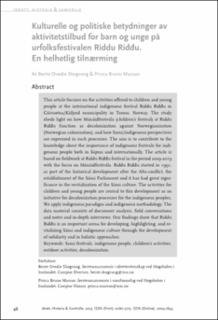Kulturelle og politiske betydninger av aktivitetstilbud for barn og unge på urfolksfestivalen Riddu Riđđu. En helhetlig tilnærming.
Peer reviewed, Journal article
Published version
Permanent lenke
https://hdl.handle.net/11250/3125194Utgivelsesdato
2023Metadata
Vis full innførselSamlinger
Originalversjon
Idrott, historia & samhälle. 2023, 48-69.Sammendrag
This article focuses on the activities offered to children and young people at the international indigenous festival Riddu Riđđu in Gáivuotna/Kåfjord municipality in Troms, Norway. The study sheds light on how Mánáidfestivála (children’s festival) at Riddu Riđđu function as decolonization against Norwegianisation (Norwegian colonisation), and how Sami/indigenous perspectives are expressed in such processes. The aim is to contribute to the knowledge about the importance of indigenous festivals for indi-genous people both in Sápmi and internationally. The article is based on fieldwork at Riddu Riđđu festival in the period 2009-2019 with the focus on Mánáidfestivála. Riddu Riđđu started in 1991, as part of the historical development after the Alta-conflict, the establishment of the Sámi Parliament and it has had great signi-ficance in the revitalization of the Sámi culture. The activities for children and young people are central to this development as an initiative for decolonization processes for the indigenous peoples. We apply indigenous paradigm and indigenous methodology. The data material consists of document analysis, field conversations and notes and in-depth interviews. Our findings show that Riddu Riđđu is an important arena for developing, highlighting, and re-vitalizing Sámi and indigenous culture through the development of solidarity and in holistic approaches.Keywords: Sami festivals, indigenous people, children’s activities, outdoor activities, decolonization.
